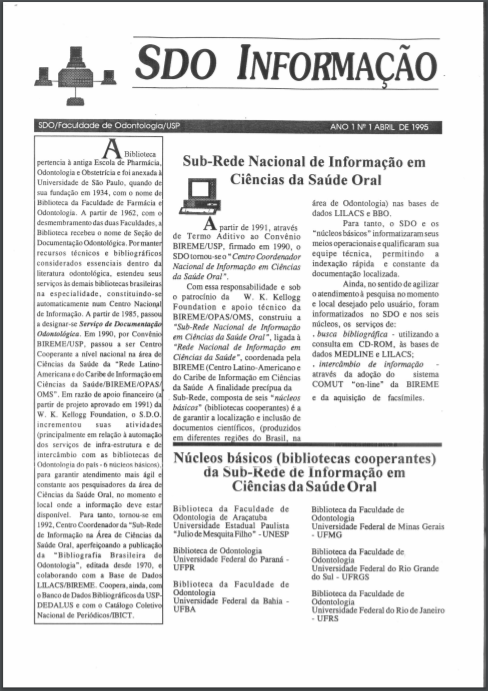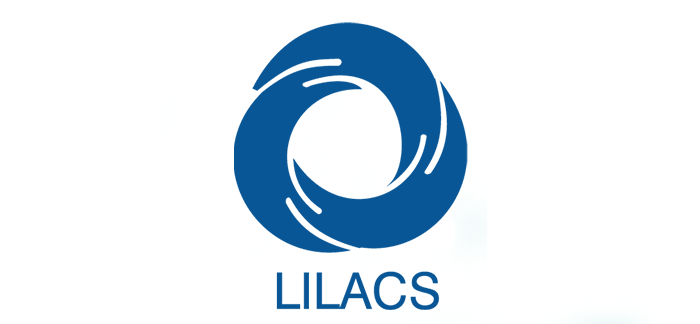LILACS 35 anos
1996
LILDBI – LILACS Bibliographic description and Indexing with DeCS consultation integrated into the system
LILDBI-Web is the software produced by BIREME for the process of bibliographic description, indexing and error control, which allows sending data for cooperation between libraries that belong to the network of Cooperating Centers of the LILACS System
1995
Creation of the Latin American and the Caribbean Health Sciences Information System
Using the LILACS Methodology, the countries that make up the Latin American and Caribbean Health Sciences Information System create local and national databases and cooperate with the LILACS supply, contributing to bibliographic control and the dissemination of scientific-technical literature. of the Region, in the technical cooperation model established by the..Read More
1994
“Advances in the operation of libraries and documentation centers: widespread use of the LILACS methodology for the harvest, processing, transfer and dissemination of bibliographic records”, presented at CRICS II
CRICS II – Challenges of the Information Era: Agents and Users (São Paulo, Brazil)
Integration of PAHO’s specialized centers to the Latin American and Caribbean Health Sciences Information System
1992
“The development of Health Information in the region from the perspective of the Health Sciences Information Network of Latin America and the Caribbean (LILACS CD-ROM)”, presented at CRICS I
CRICS I – Information on Health Sciences in Latin America and the Caribbean: current situation, new trends and the application of modern information technologies (São Paulo, Brazil)
Decentralization of journals assessment and selection for indexing in LILACS
Since October 1992, each country of the Latin American and Caribbean Information System in Health Sciences, through the National Coordinating Centers (CCN), is responsible for the selection of national journal titles
Launching of the systems DBAC (Computer Aided Bibliographic Description) and DCAC (Computer Aided Content Description)
(Acronyms for their titles in Portuguese and Spanish) Software developed by Bireme for Bibliographic Description and Content Description
1991
Formation of the “National Sub-Network of Information in the Area of Oral Health Sciences”
The objective of this Sub-Network, was to provide to the different regions of the country the agilization of the research activities – facing the main needs of its customers – assisting the search, localization, retrieval of information as well as collecting national scientific production in the dental area.
1989
Sending BIREME teams to train LILACS cooperating centers
1988
Launching of the LILACS CD-ROM
The LILACS CD-ROM released in 1988 was one of the first scientific information CD-ROMs produced in the world
1987
Creation of Latin-American and Caribbean Information System in Health Sciences
The Latin-American and Caribbean Information System in Health Sciences assumes that each country has a National Coordinating Center (CCN) and a network of Cooperating Centers
Building of REPEBIS – Peruvian Health Libraries Network
The Peruvian Health Libraries Network was created so that all Peruvian institutions in the health area make available the full text of their scientific output using the LILACS methodology.
SURENF – Brazilian Sub-Network of Information on Nursing of the BIREME/PAHO Sytem
Coordinated by the J. Baeta Vianna Library of the School of Nursing of the Federal University of Minas Gerais (UFMG), the Brazilian Sub-network of Nursing Information (SURENF) is responsible for the BDENF and the Specialized Nursing Coordinator Center of the LILACS System.
Honduras joins the Latin American Health Sciences Information Network
REDIDOSAH, Health Documental Information Network in Honduras is integrated to Latinamerican Health Network (BIREME) http://www.leyes.bvs.hn/Honduras/pdf/RED.pdf
1986
Adoption of MicroISIS for data entry
One of the first applications of the MicroISIS Software was used in the health area by BIREME for the decentralized feeding of the LILACS database
Adoption of DeCS/MeSH and launching of the Public Health category for the indexing of LILACS documents
The production of LILACS was preceded by the development of a controlled vocabulary. Descriptors in Health Sciences (DeCS), which includes, in addition to the Spanish and Portuguese translations of the terms of the medical subject titles (MeSH) of NLM, a category of specific terms to describe the public health literature..Read More
1985
MeSH translation into Spanish by BINAME/ CENDIM from Uruguay
1982
BIREME is renamed to Latin American and Caribbean Center on Health Sciences Information
In 1982 BIREME changed its name to Latin America and the Caribbean Information Center on Health Sciences to better express its functions aimed at strengthening and expanding the flow of scientific and technical information in health throughout the region, but it maintained its initials



